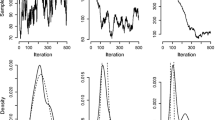Abstract
This article develops an ergodic theory of freedom and its measurement. The key idea is that freedom and uncertainty are inextricably entwined. Measuretheoretic isomorphism of stationary processes is a natural way of identifying at an abstract level identity of the structure of uncertainty, which can be measured by the entropy rate of a stationary process. Various empirical examples of markets and elections are considered, as well as the Kantian, as opposed to utilitarian, philosophical framework of the general ideas.
Similar content being viewed by others
References
Adler RL, Shields P, Smorodinsky M (1972) Irreducible Markov shifts. Ann Math Statistics 43(3): 1027–1029
Aydelotte WO (1963) Voting patterns in the British House of Commons in the 1840s. Comp Stud Soc Hist V, 134–163
Bass FM (1974) The theory of stochastic preference and brand switching. J Marketing Res, XI: 1–20
Beath J, Katsoulacos Y (1991) The economic theory of product differentiation. Cambridge University Press, Cambridge
Bossert W, Pattanaik P, Xu Y (1994) Ranking opportunity sets: an axiomatic approach. J Econ Theory 63: 326–345
Congressional quarterly's guide to U.S. elections (1994) Congressional Quarterly Inc, Washington, D.C.
Cover TM, Thomas JA (1991) Elements of information theory. Wiley, New York
Curry B, George K (1983) Industrial concentration: a survey. J Ind Econ XXX: 203–255
Encaoua D, Jacquemin A (1980) Degree of monopoly, indices of concentration and threat of entry. Int Econ Rev 21: 87–105
Foley DK (1994) A statistical equilibrium theory of markets. J Econ Theory 62: 321–345
Friedman NA, Ornstein DS (1970) On isomorphism of weak Bernoulli transformations. Adv Math 5: 365–394
Kant I (1790) The critique of judgement (J. Creed Meredith, Trans. (1928/1952)). Oxford University Press, New York
Kant I (1781/1787) Critique of pure reason (N. Kemp Smith, Trans. (1929/1965)). St. Martin's Press, New York
Kolmogorov AN (1958) A new metric invariant of transient dynamical systems and automorphisms in Lebesgue space. Dokl Akad Nauk SSSR, 119: 861–864 (Russian) MR 21 # 2035a
Kolmogorov AN (1959) Entropy per unit time as a metric invariant of automorphism. Dokl Akad Nauk SSSR, 124: 754–755 (Russian) MR 2 # 2035b
Lancaster K (1966) A new approach to consumer theory. J Polit Econ 74: 132–157
Lancaster K (1979) Variety, equity, and efficiency. Columbia University Press, New York
McCarthy PS, Kannan PK, Chandrasekharan R, Wright GP (1992) Estimating loyalty and switching with an application to the automobile market. Manage Science, 38(10): 1371–1393
Ornstein DS (1970) Bernoulli shifts with the same entropy are isomorphic. Adv Math 4: 337–352
Ornstein DS, Weiss B (1991) Statistical properties of chaotic systems. Bull (New Series) Am Math Soc 24(1): 11–116
Sinai YaG (1959) On the notion of entropy of a dynamical system. Dokl Akad Nauk SSSR 124: 768–771
Suppes P (1987) Maximizing freedom of decision: An axiomatic analysis. In: Feiwel GR (ed.) Arrow and the foundations of economic policy, pp. 243–254. New York University Press, New York
Suppes P (1988) Lorenz curves for various processes: A pluralistic approach to equity. Soc Choice Welfare 5: 89–101
Suppes P (1993) The transcendental character of determinism. Midwest Studies Philos XVIII: 242–257
Suppes P (1994) Voluntary motion, biological computation and free will. Midwest Studies Philos XIX: 452–467
Tirole J (1988) The theory of industrial organization. MIT Press, Cambridge
United States Bureau of the Census (1975) Historical statistics of the United States colonial times to 1970, Bicentennial edition, Part II. Washington, D.C.
Author information
Authors and Affiliations
Rights and permissions
About this article
Cite this article
Suppes, P. The nature and measurement of freedom. Soc Choice Welfare 13, 183–200 (1996). https://doi.org/10.1007/BF00183350
Received:
Accepted:
Issue Date:
DOI: https://doi.org/10.1007/BF00183350




